How to Start a Church: Everything You Need to Know
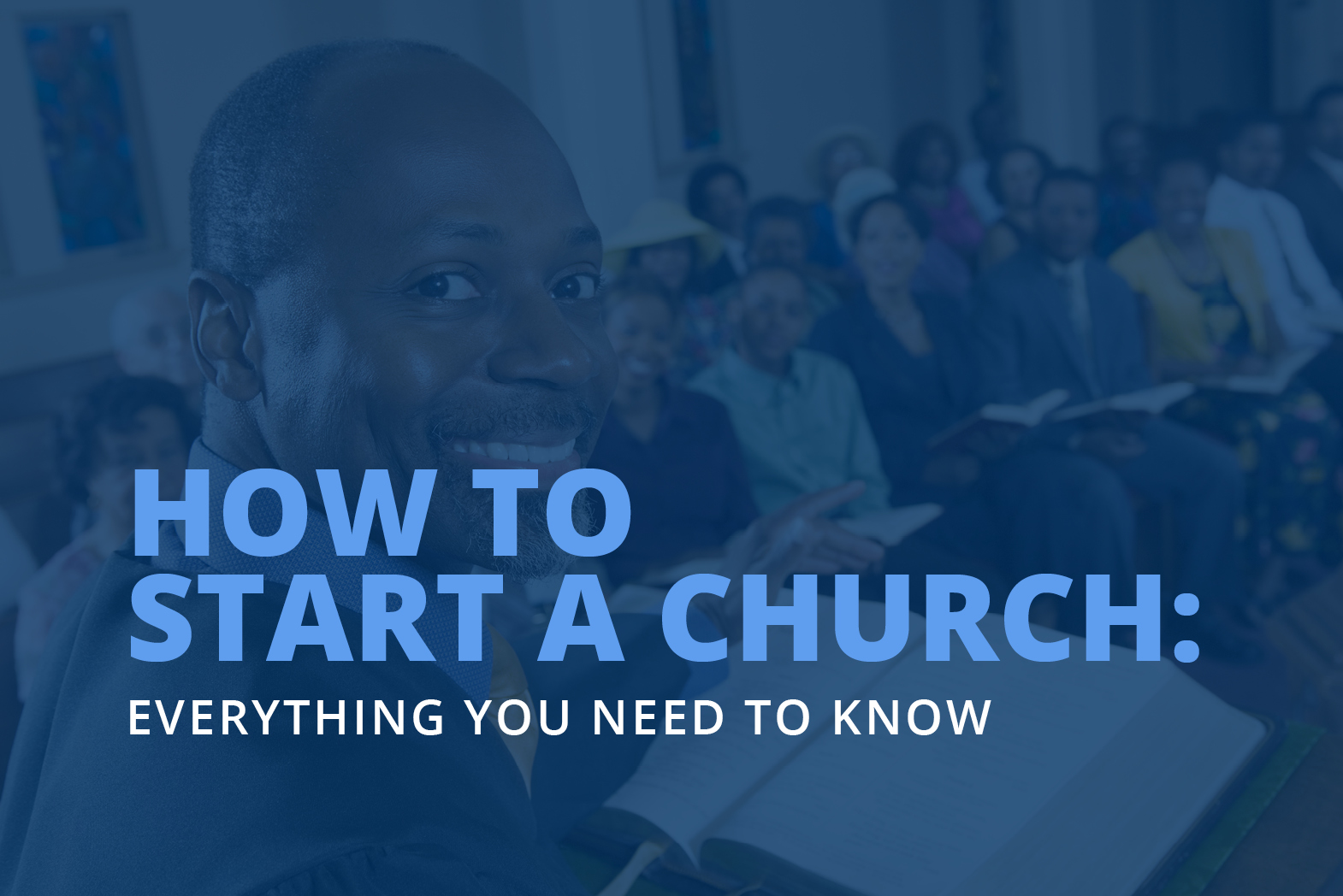
There are 156 million unchurched people in the U.S., and nearly half of that population is open to being invited to church. If you’re interested in reaching these people by starting a church, you must plan the logistics of your church’s location, mission, leadership, and other operations.
In this expert guide, we’ll explain how to start a church by covering the following topics:
- What Does It Mean To Start A Church?
- Why Start A Church?
- How to Start a Church in 5 Steps
- Tips For An Easy Church Startup
Anyone can feel called to start a church, whether you’re a nonprofit professional or have no experience in starting an organization. To get started, let’s take a closer look at what it means to start a church.
What Does It Mean To Start A Church?
Some people gather to worship in their homes. Others livestream sermons on their living room TV or attend large churches with multiple locations and numerous pastors. Churches can be operated and attended in various ways, so what do we mean when we say this guide will teach you how to start a church? Let’s start with the IRS’s definition of a church.
How does the IRS define a church?
While the IRS doesn’t explicitly define the term “church” in the Internal Revenue Code, there are 14 attributes of churches developed by the IRS to determine whether an organization is considered a church for tax purposes. These characteristics include:
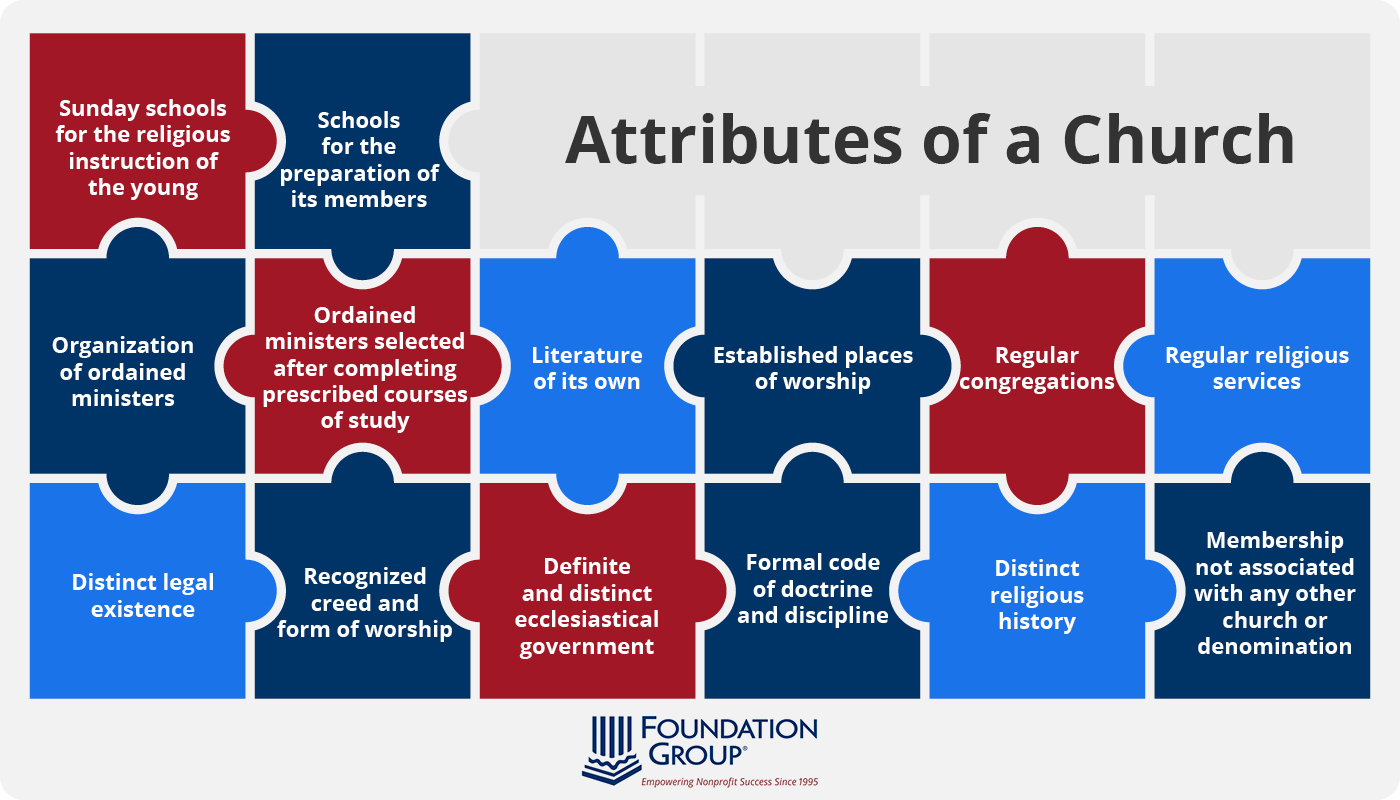
- Distinct legal existence
- Recognized creed and form of worship
- Definite and distinct ecclesiastical government
- Formal code of doctrine and discipline
- Distinct religious history
- Membership not associated with any other church or denomination
- Organization of ordained ministers
- Ordained ministers selected after completing prescribed courses of study
- Literature of its own
- Established places of worship
- Regular congregations
- Regular religious services
- Sunday schools for the religious instruction of the young
- Schools for the preparation of its members
While your organization doesn’t need all 14 attributes to qualify as a church for tax purposes, it can be a helpful checklist for your startup process.
What is a church startup?
By definition, a church is a building used for Christian worship. However, you know that the church is much more than a building. It includes the congregation, leadership, external ministries, and more.
For this reason, a church startup is the process of planning all of a church’s operations, including its location, leadership, and community outreach. While churches are automatically given nonprofit status, there are advantages to applying for 501(c)(3) status and complying with legal requirements, which is another crucial part of the startup process.
What is church planting?
While church planting can sometimes refer to the process of starting multiple churches, it generally refers to starting a church. Whether you’re starting your first church or fifth one, this process typically includes:
- Planning church logistics, like bylaws and mission statements
- Finding a physical location for your church
- Establishing church leadership
- Gathering a congregation
Starting a church is a huge task, so you should have a clear plan for your startup before taking the plunge. After all, a church that aims to reach people worldwide looks a lot different than a local congregation in a small community. That’s why you should establish your goals before starting a church.
Why Start A Church?
If you’re reading this guide, you likely want to start a church and already know why. However, specifically defining your intentions for the church will help guide your decision-making in the startup process to support your goals.
Ask yourself the following questions to determine the goals of your church startup:
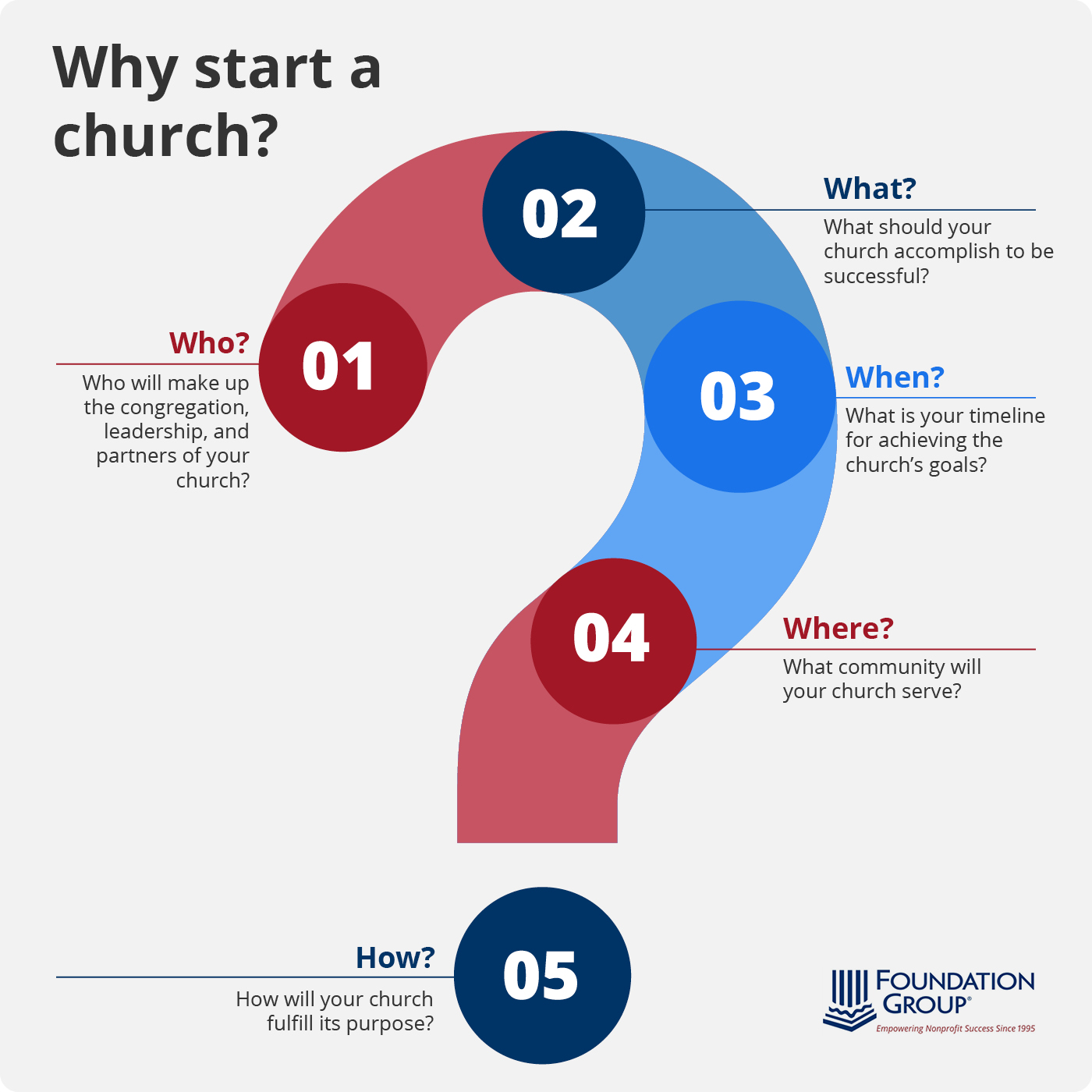
- Who? Identify the group you want to reach with your church startup.
- What? Determine your church’s goals and what it will aim to accomplish.
- When? Set a timeline for starting, growing, and making an impact through your church.
- Where? Choose a community for your church, considering who you want to reach and where your building should be located.
- How? Clearly define how you plan to fulfill your church’s mission.
Your answers to the above questions will create a roadmap for fulfilling your church’s mission. Equipped with clear goals, you can start making concrete plans and decisions about your new church.
How to Start a Church in 5 Steps
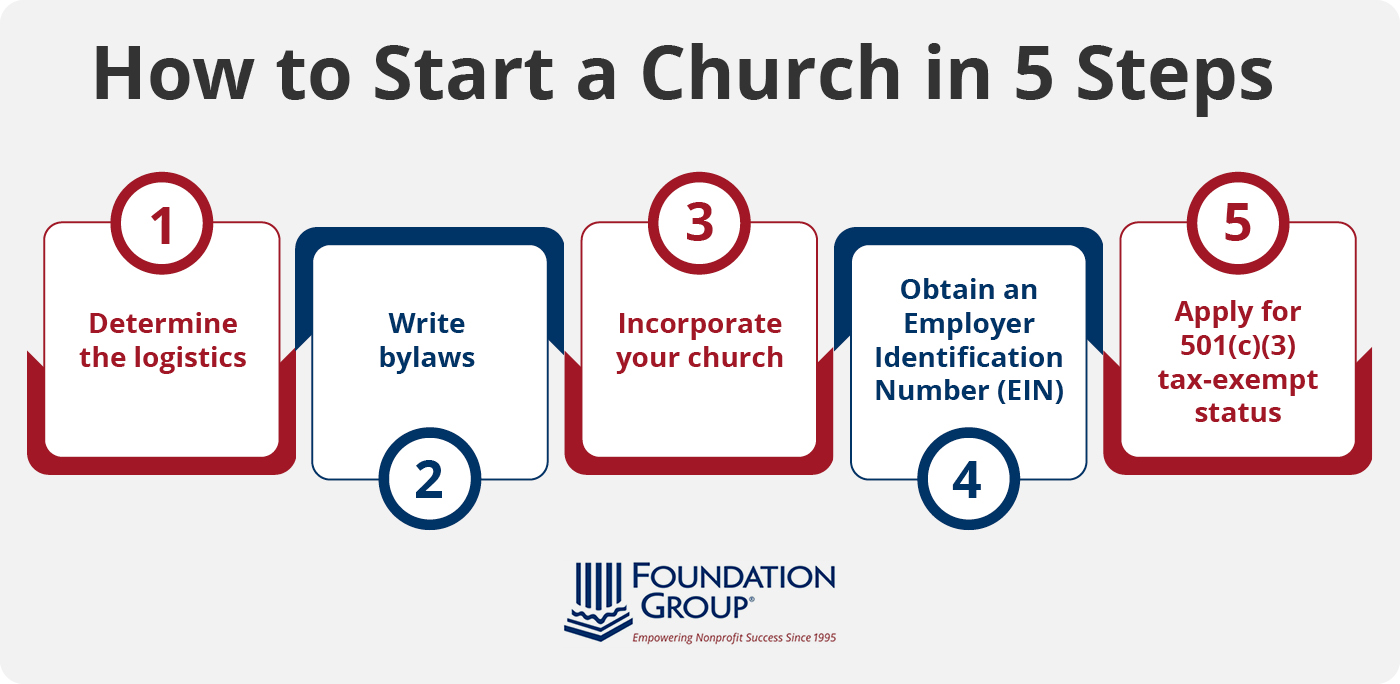
1. Determine the logistics
First and foremost, you’ll need to decide your church’s identity. This includes:
- Name
- Core beliefs
- Mission
- Denomination
- Leadership structure
These elements dictate much of how your church will operate, but also how you’ll be identified in the community. Just like charitable organizations and for-profit businesses, your church will have a brand and a reputation as it gains visibility.
2. Write bylaws
Every organization needs a set of rules to guide how it will be organized, and the same is true for churches. There are a variety of ways your church may be organized, including:
- Elder-led
- Congregational
- Board of directors
Your bylaws will ensure that your church is run the way it was intended. While they’re helpful documents in general, they’re also necessary if you choose to apply for 501(c)(3) status—and you should.
3. Incorporate your church
Once you’ve settled on an official name for your church (and checked to make sure no other organization exists with this name), you’re ready to file Articles of Incorporation. These should include:
- Purpose statement
- Dissolution statement
- State and IRS provisions
An incorporated church is its own legal entity, enabling it to act as a formally organized entity and accept liability for its actions. You can file your Articles of Incorporation with the secretary of state’s office in the state in which your church is being formed.
4. Obtain an Employer Identification Number (EIN)
Your employer identification number (EIN) is like a social security number for your church. It identifies your organization so that you can complete other vital steps needed to start your church, like getting a bank account so you can pay your staff! Complete Form SS-4, filling out basic information such as:
- Your church’s name
- The address of your church
- The type of entity
While this application may seem simple, be careful to answer everything on Form SS-4 correctly. You may be denied 501(c)(3) status if you answered anything incorrectly and could face other classification problems, as well.
5. Apply for 501(c)(3) tax-exempt status
While churches are automatically tax-exempt because of the non-commercial nature of their activities, there are advantages to officially applying for 501(c)(3) status. Your determination letter from the IRS helps donors claim tax deductibility for their contributions to your church and also allows your church to obtain property tax exemption.
To apply for 501(c)(3) status, your church must complete Form 1023, which requires:
- Financial information, including history and projections
- Information to prove 501(c)(3) eligibility
- Bylaws that have already been adopted and approved
You’ll also need to submit other materials, such as your Articles of Incorporation.
Tips For An Easy Church Startup
The best way to start a church is to solidify your nonprofit and tax-exempt status by incorporating your church and filing for 501(c)(3) determination. But how can you ensure you do everything the right way, especially when your passion is your ministry?
The best step you can take to easily and accurately start a church is to trust a professional. Outsourcing these tasks to an experienced compliance specialist can help you avoid mistakes and get started as smoothly as possible. A professional can help you:
- Check name availability
- Apply for your Federal EIN
- File Articles of Incorporation
- Draft your bylaws
- Apply for 501(c)(3) status
At Foundation Group, our experts have helped over 25,000 startups nationwide with 100% success, since 1995. Our SureStart™ nonprofit formation services offer these essential solutions (and more) to start your church with ease.
Additional Church Planting Resources
Starting a church can be difficult, but don’t let the process deter you from your ministry. A church can make a significant impact on the lives of others, which is why it’s crucial that your church startup is a success!
If you need more guidance on how to start a church, check out the following resources:
- How to Start a 501(c)(3) Nonprofit. Looking for more information on getting started? Check out our guide to starting a 501(c)(3) nonprofit for more information.
- The Best Guide to Bookkeeping for Nonprofits: How to Succeed. Starting your church is just the first step, but you’ll need to maintain compliance to keep everything running smoothly. Learn how to tackle nonprofit bookkeeping needs in this guide.
- Should Your Nonprofit Outsource its Bookkeeping Needs? Much like the startup process, bookkeeping for your church can take your focus away from your mission. Read this guide to learn about outsourcing and why it might be beneficial for your church.
who subscribe to our free, email newsletter. It’s information that will empower your nonprofit!
Comments (3)
Comments are closed.


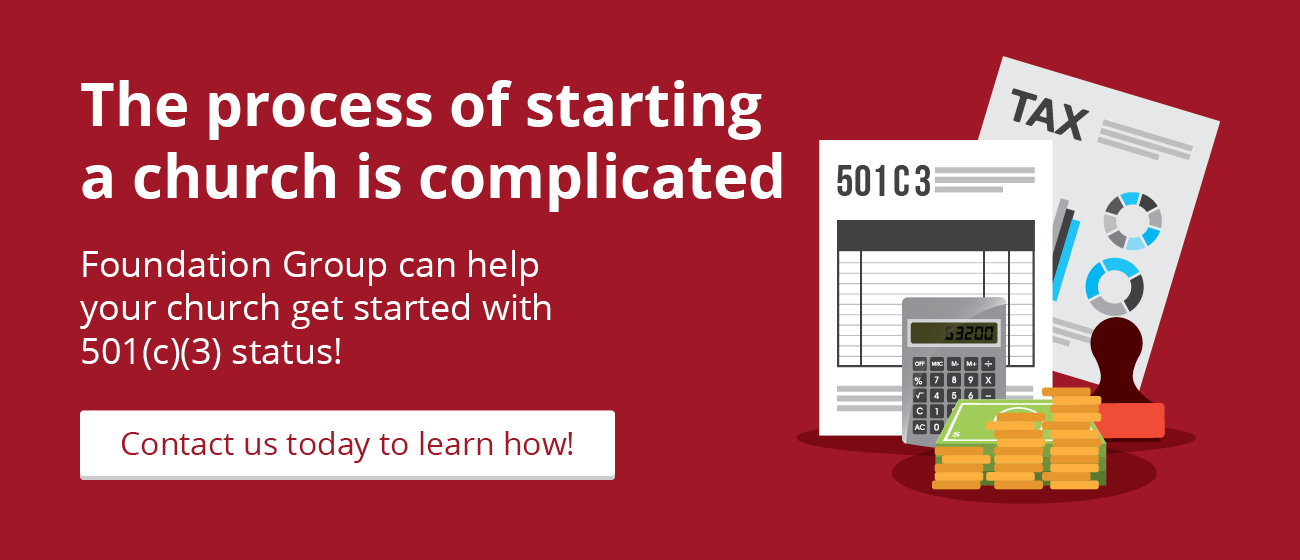
Myself and my brother are both licensed ministers and thinking of starting a new church where we would welcome pets to join their owners, and if tithes were to be given, we would donate it to a local no kill shelter. (So far only three others we know have taken an interest in the idea). With that said, how would we qualify it for a tax exemption?
What you do with donations really isn’t the issue. It’s whether or not the IRS would recognize what you’re proposing to do as a church. If the mission and purpose is religious, you have an established congregation that is more than just 4 or 5 people, and you have regular services at a physical location, you most likely would qualify under church standards.
Greetings to you Sir,
Our organization is Voice Of The World Ministries, it’s a non profit and non government organisation, we are working in rural villages,
Our main objective is to develop all kinds of people living in rural areas by organizing awareness seminars on education, health and hygiene. Encourage with your valuable advice and suggestions,